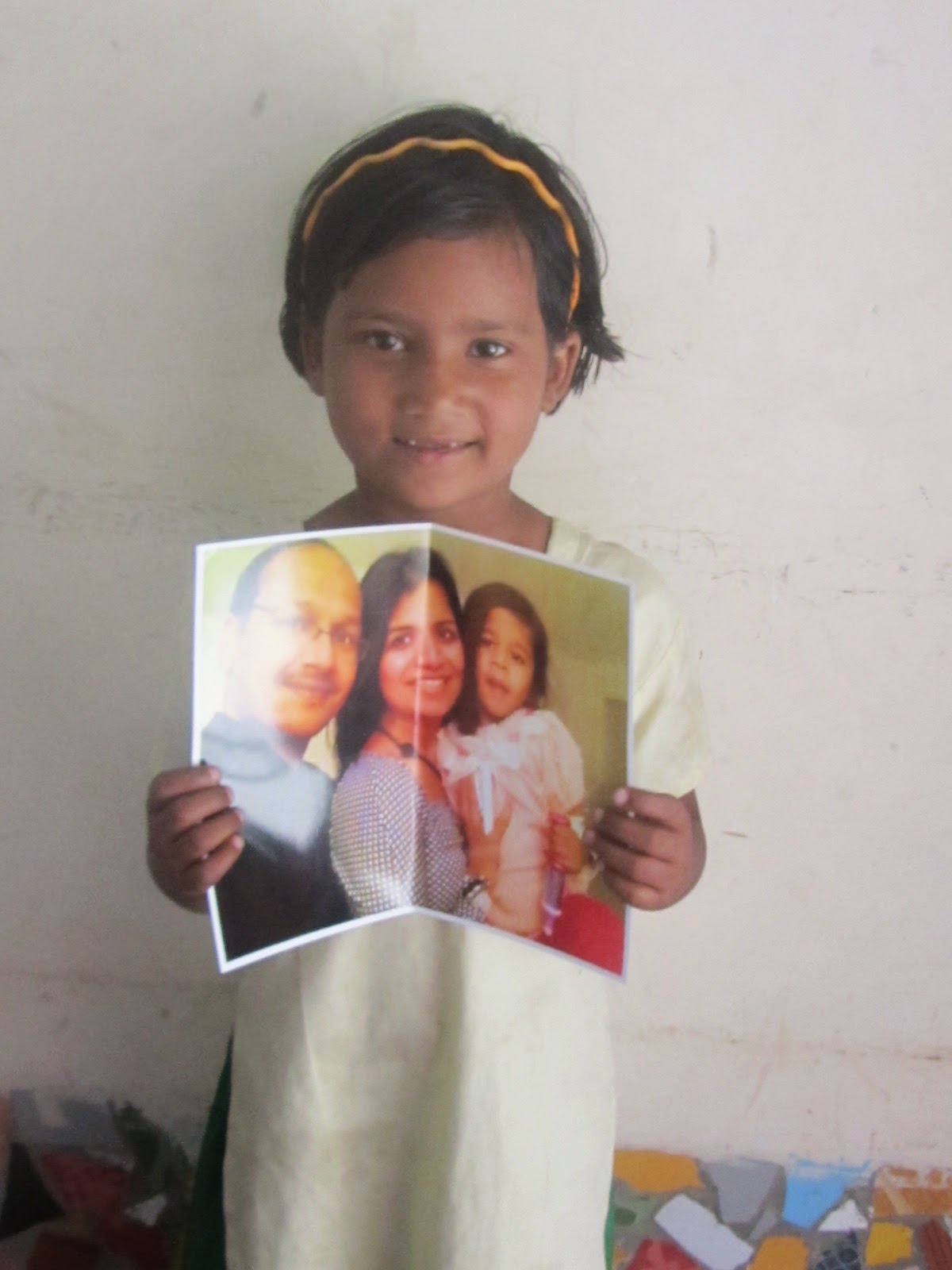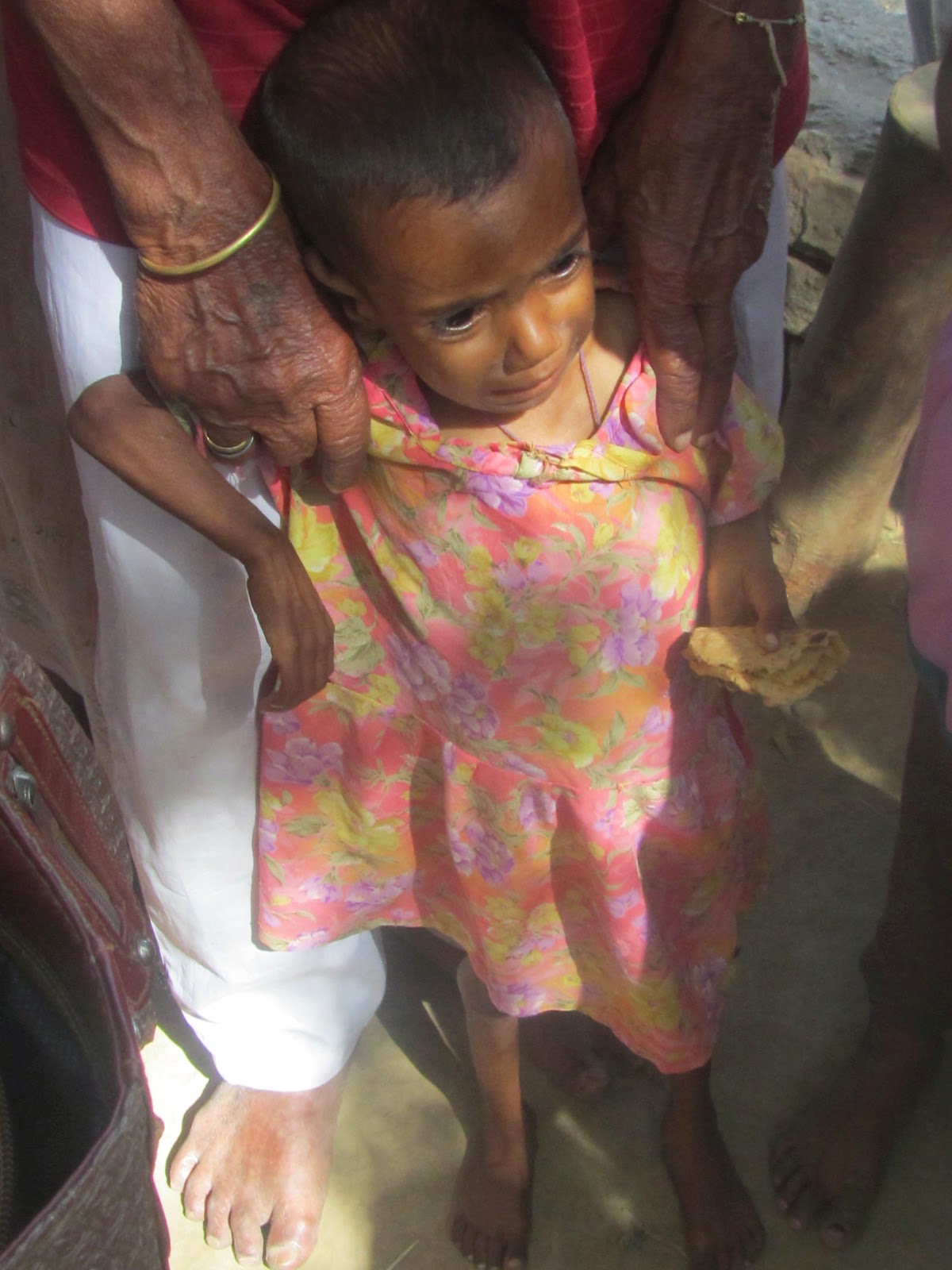Trip #4- Continuing the work at Pardada Pardadi- 2014
On Easter Sunday, as I began to write about my most
recent trip to Pardada Pardadi, I found that I struggled for words that would
be adequate in describing this experience in India. I have had so many friends,
family and supporters asking about my time there, so it’s time to find the
words. My heart is always with the girls
at PPES, who count among the most needy
girls in our world. Their hope for a bright future is the result of everyone
who cares enough to provide support for their education, and for the incredible
work being done at PPES.
So many memories swirl about in my head as I reflect back
over the weeks there. I have found that processing my experiences
has become more challenging, as I have been given the privilege of delving
deeper into the lives of the people, and witness so many unthinkable things
that are a part of life in the village. From
our arrival in Delhi, until my departure, every day provided the opportunity to
live amongst, and love, so many wonderful girls and their families, and the
staff, who have allowed me to be a part of their lives. The warmth and hospitality, along with the
many incredible experiences that most in the western world will never
experience, can also be too much at times. Yet, I know that God gives me all that I need to
continue the work I have been called to.
The first week was filled with 5 days
of medical camps, with two US and three Indian doctors. This incredible team was able to see hundreds
of patients/villagers during five days of camps in two of the very poorest
local villages, as well as at the school. Bringing medical care to the people
in this region is huge, as virtually no care exists in this region. Students and staff alike were able to see
doctors, and be treated for a vast array of conditions. Lots of antibiotics were distributed for the
many infections, mostly the result of poor hygiene. Our
dermatologist, was able to treat so many skin conditions that will never be
seen in the US, most of which could be prevented with simple hygiene. The people tend to have little concept of
what that entails. We hope that through school
and community health and hygiene education programs, villagers can begin to
practice safe hygiene, thus improve their health.
International Medical Relief-
IMR will be returning to PPES in June. Last year, 22 US medical personnel saw
2500 villagers during 6 days of medical camps.
PPES looks forward to hosting IMR this June, when they return to bring
medical care to the villagers. $20,000
is needed for the Health Center, nurse’s salary and two doctor’s salaries. Two
doctors come to the school on Saturday’s to see girls and villagers.
To summarize some of the incredible
moments……
~the distribution of 2200 pair of
undies, all donated in the US. Many of our girls have never had a
pair of new panties, so this was an exciting time. Thank you to all who made
this project the great success it was. Last
summer, our students appreciated
receiving over 1000 bras from the US.
~120 preschoolers
receiving their first combs. This included a hygiene lesson about combs
being your own, and they are not to be shared.
Lice, bugs and scalp infections are a challenge at the school. I brought
treatment for lice to the school to be used by our school nurse. Again, it was fun to watch!
~A big
thank you to Soap Box Soaps for donating 1800 bars of soap to the school, for girls to take home, and for use at
the school. Soap, and handwashing, has decreased illness significantly.
~A big thank you to the students
who worked with the doctors at the medical camps. This may change the course of their futures,
as they consider a nursing as a career. The confidence and leadership abilities
demonstrated is gratifying, knowing we are truly making a difference. A simple, “I’m so proud of you”, “you’re
doing a great job”, are words they may
never have heard before. A great smile makes my work so gratifying.
~Solar lantern project- 200 lanterns have been distributed in the very poorest village, to encourage girls to attend school. 85% of the village girls still do not attend school. Your daughter in school, with a 70% attendance rate, provides the family with light at night they have never had. Girls can study and teach their families what they have learned in school.
~Eyeglasses, a
newer concept at the school - 22 of our girls visited the local eye ophthalmologist.
60 % of our girls are malnourished by WHO standards, which causes problems with
vision. Though some of our girls now
have eyeglasses, their eyesight will continue to be problematic until their
nutrition improves. The school needs
$12,000 for the Nutrition Enhancement program, which will improve the overall
health of our girls.
~ My visit with Reena, a teacher at PPES. Reena was married in a love marriage, to Ritul, also a teacher at the school. Her father and brothers have attempted to kill her for doing this, so they had to go into hiding. She has been completely estranged from her entire family as the result of making that decision. Today, they have a beautiful baby girl. She will grow up with parents who are educated, value girls and have resisted the cultural tradition of arranged marriage.
~Village visits.
One of the highlights of this trip was the opportunity to visit many of the
villages, and the homes of our girls. This experience ranged from excitement to
heartbreak. Word spreads quickly that we
are in the village, and before long I feel like the pied piper walking the
streets, accompanied by children, as we weave in and out of houses. Among the images, forever etched in my mind,
is this little girl who is so extremely malnourished, likely to die from the
condition. This is a common reality in the village, not just a picture in a
magazine.
I met with Pooja’s mother and her 6 year old sister.
Pooja, 8 years old and a Class 1 student, was recently killed by a poisonous
snake, as she swept her home. The snake
still roams, as Hindu beliefs prevent killing anything. I cannot imagine the
fear of her family and villagers, knowing the snake is still out there and can
strike down another life. The pain of
the mother losing a child is the same the world over, so meeting with Pooja’s
mother was heartbreaking. I think of Archna, her 6 year old sister, having
lost her big sister and best friend. Her cousin, Kajill, pictured here, also
attends PPES.
Elsa, our school nurse and my interpreter, took me to
Manisha’s house to meet her 95 year old, blind grandmother. Manisha has no parents, and her role in life
is to care for her grandmother, in one room, infested with rats at night. They
count among the most vulnerable. I am
left to wonder what will happen to Manisha when her grandmother dies. Will she
be “married” off, sold into the brothel life?
My tour guides. Anjali and Chamma…they were a delight as
they accompanied me for a day of village tours. They were thrilled to carry my
backpack, notebook and cameras. It has been wonderful watching these girls grow
since 2010. Their father and grandfather are in prison, so the children and
mothers are on their own. It is great
fun being with them, as they take pride in taking me to the homes of our
students.
Polio continues to impact lives in rural India, despite
what WHO reports. I have met too many young
people who have polio, including students at PPES, with no treatment available,
nor devices to improve their mobility.
Typhoid continues to kill children in the village, as does cholera,
malaria and many other diseases long eradicated
in the US. $26,000 is needed to
vaccinate our girls, as the Indian government, continues to nothing for these children.
There is a vast scale of conditions for living in dire
poverty. The narrow roads, too small for
a vehicle, the intense heat of the sun, the animals living in the homes(some
just one room, with a buffalo or two),while the children and adults roam
barefoot, the dust and smoke in the air,
the stench of garbage piles can be too
much at times, and the condition of the children, malnourished, in rags or
nothing at all, so very dirty-are all witnessed on these visits. Though all of our girls live in the dire of poverty, some live better than
others. This might mean the house has a
toilet(outdoor, squat), a water source,
and a dirt floor swept clean. It
also might mean the family has a door on the house. The women and children
are so vulnerable, with no protection.
Child sponsorship- $40/month is what it costs to educate
a child at Pardada Pardadi. This includes 3 meals a day, 2
uniforms/shoes/sweater, transportation(bicycle or bus), textbooks and health
care.
Every day at Pardada Pardadi is incredible! To witness success, confidence and self-esteem,
as our girls learn that they deserve to be treated as equals to boys, to have
dreams and actually live them out, and to change the face of India for their
own daughters, is what keeps me coming back. It is also very challenging, due to conditions and coming face to face with unthinkable conditions without any warning. The commitment and love I have for the school is greater than the adversity, which has provided me with opportunities
most Westerners will never see.
We cannot do this without your help. Please visit education4change.org to make a
donation today.
Or send a check to: PPES 321 Hillside Lane Kennett Square,
PA 19348
I can assure you that your donation will be well used, in the
area that you see as the need you would like to support. …………………………………………..
.JPG)
.JPG)
.JPG)
.JPG)

.JPG)


















.JPG)






